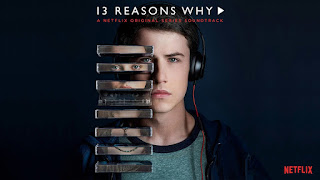Netflix's Powerful, Controversial Series
"I guess that's the point of it all: No one knows for certain how much impact they have on the lives of other people. Oftentimes, we have no clue. Yet we push it just the same." — Jay Asher, "13 Reasons Why"
According to statistics, April is the month with the highest instance of suicides. It seems like no accident, then, that "13 Reasons Why," Neflix's controversial new series based on the novel by Jay Asher, was released on March 31. The series, like the book, follows Clay (Dylan Minnette), a high school junior who receives audio tapes from a classmate who took her life.
Over the course of 13 emotionally testing episodes, the story of Hannah Baker (Katherine Langford) plays out. At first, it feels familiar to anyone who attended high school. But as the story progresses, the events get darker and more difficult to watch.
Since its release, the show has been a trending topic on Social Media and in the news. And a controversial one, too. Some have praised the show and talked about its importance for viewers. Others have condemned the series for being too glib about something as important as suicide.
I have mixed feelings. I watched the whole series, and thought it was, frequently, emotionally devastating. But it was also quite gripping. It's been a couple weeks since I finished the series, and it's given me time to reflect on it.
There's two ways to reflect on the the series — a a piece of cinematic art, and as a cautionary tale. I'll address its artistic merit first. And this is a series that has plenty of artistic merit. It's one of the best shows I've seen this year, with fantastic performances, especially from Minnette and Langford in the lead roles.
It is also one of the most brutally emotional shows I've seen. Yet, it's handled with a beautiful amount of grace. I wouldn't be surprised to see it remembered come awards season, and I think the quality of the production is one of the reasons its been in the cultural zeitgeist the past month.
And that's one of the reasons there's been a lot of talk about a season two. That's where I struggle. I'm not sure this is a show that should have a second season. I was satisfied with the first, and though not everything was explained and answered, I thought the core of the narrative was complete. This is an artistic endeavor that, I felt, could stand on its own with what's already come. I'm not sure a follow up set of episodes could add anything constructive to this narrative. Plus, without Langford's haunting narrative and performance of Langford. And there's no organic way to keep her in a second season.
The second aspect is as a cautionary tale, and that's where i have mixed feelings. Some have complained that the series glamorizes suicide. I disagree with that, but it certainly puts the topic front-and-center. Another complaint has been that the series would be harmful to someone who's having suicidal thoughts. That seems like a fair point, and one that I don't feel qualified to address.
I will simply address my take away from the series. I don't know if it would be a good or beneficial series for teenagers to watch, but as an adult reflecting on the series, my main take away was how important it is to look out for people in your life who are desperately lonely and need help. The people that tend to be ignored because we lead busy, full lives.
And I think that was the takeaway for Clay, the main character, too. One of the instructive quotes from the book is, "You can't rewrite the past," and that's true. But you can change the future. A few of the people on Hannah's tapes committed heinous crimes that deserve punishment. But many, including Clay, were guilty of being selfish and oblivious, as we all are.
I think that was the main take away I derived from the series. The way we treat each other matters. Noticing those around you matter. And it can make a difference.




Comments
Post a Comment